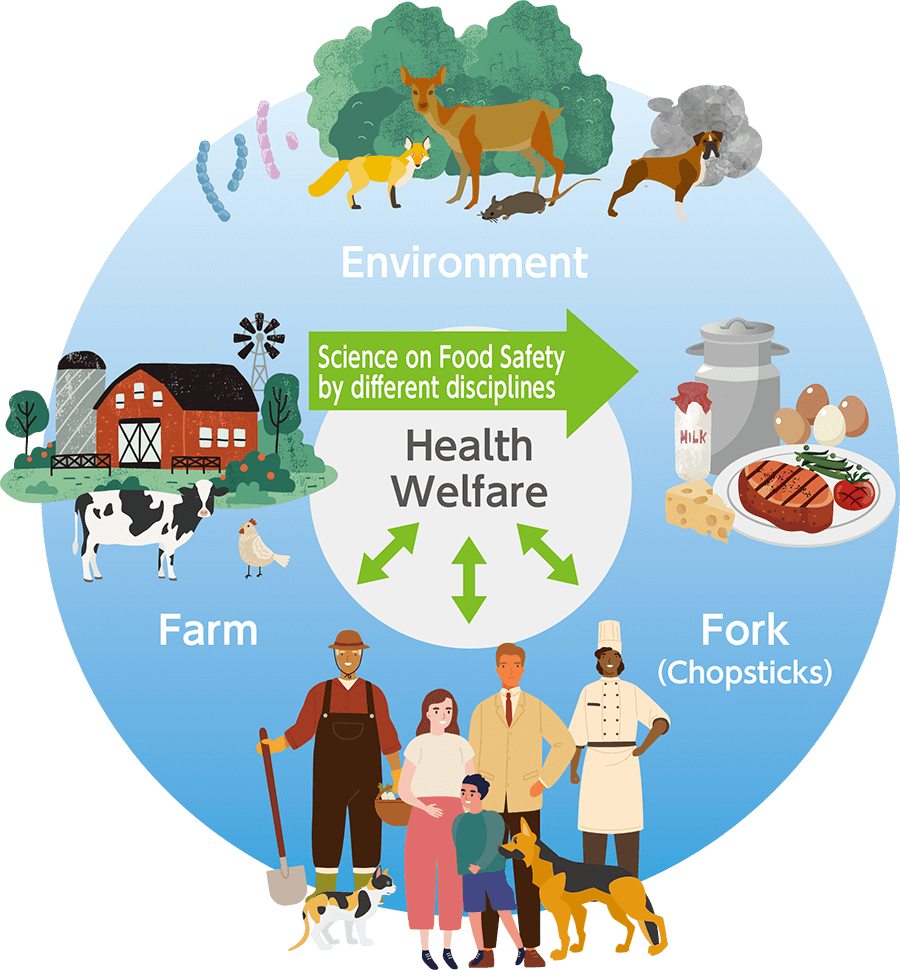About Our Units
Division of Preventive Veterinary Medicine:DPVM
The Division of Preventive Veterinary Medicine comprehensively studies humans, animals and the environmental health.
This new field combines livestock health and public health. Rakuno Gakuen University is one of the forerunners
in this field and has been selected as a member of Collaborating Centre Consortium for Food Safety of the World Organisation for
Animal Health (WOAH) along with the Research Center for Food Safety of the University of Tokyo and
the National Centre for Food Science, Singapore Food Agency.
Under the philosophy of “Onehealth,” which means the collaborative effort of multiple disciplines working locally,
nationally and globally to attain health of that humans, animals and the environment, this field aims to offer
practical learning opportunities focusing on disease prevention and control.

Veterinary Epidemiology
Problem-orientated approach and One Health are the key-concepts of the educational and research activities. The unit examines sociological and economical nature of a food safety problem in Japan and developing countries in Asia and Africa, and presents the solution by both quantitative and qualitative epidemiological investigations involving participatory methods, risk analysis and other epidemiological and economic analyses.
Veterinary Herd Health
This unit was established by professors of Division of Large Animal Clinical Sciences in 2008 in order to reinforce the education and research in preventive medicine. Many veterinarians always support the supply of safe and reliable livestock products for the public. To perform and continue this important responsibility, it is essential to predict and manage the diseases of food animals in the farms. Veterinary Herd Health deals with the prediction and control of diseases and risk analysis in productivity from the point of herd level or region. As a research subject, this unit mainly focuses on dairy cattle management.
Food Microbiology and Food Safety
This unit is managed by Professor Masaru Usui and Lecturer Akira Fukuda. This unit covers a broad rang in molecular biological studies of the microbial, antimicrobial resistance, animal diseases and food linkage. The main theme of this unit is the molecular epidemiology of antimicrobial resistance derived from animals. To resolve the problem of antimicrobial resistance among humans, animals, and environments,
- We investigate the dissemination route of antimicrobial resistance from animals to humans.
- We develop the detection kit for antimicrobial resistant-bacteria.
- We investigate alternative method for using antimicrobials.
Results from these studies can be used to develop technology to contribute public health.
Animal Health
The main research subject of Animal Health Unit is prevention of animal disease in farm animals and it has three dimensions (see below scopes). Especially, this unit is researching about immunological studies on the control of bovine mastitis on dairy farm. Mastitis is a serious problem of dairy industry in all over the world. The purpose of the research is to develop the new method for the prevention of mastitis in commercial dairy farms.
- Preventive research on animal disease in farm animals
- Immunological studies on the control of bovine mastitis on dairy farm
- Basic research on cow’s mammary gland immune system
Zoonotic Diseases
In recent years, social issues related to zoonotic infectious diseases such as COVID-19, avian influenza, and antimicrobial-resistant bacteria have been increasingly highlighted. These challenges are expected to become even more significant in the future, against a background of large-scale climate change, globalization of logistics, and the intensification and industrial consolidation of livestock and aquaculture production. In response to these emerging needs of modern society, the Unit of Zoonotic Disease was established in 2008, alongside the Unit of Food Hygiene, with the aim of enhancing education and research in the field of veterinary public health. The Unit mainly conducts epidemiological studies on zoonotic bacteria such as Coxiella burnetii, the causative agent of Q fever, surveys on the prevalence of oral bacteria with pathogenic potential to humans in dogs and cats; as well as epidemiological research of tick-borne diseases such as tick-borne encephalitis and severe fever with thrombocytopenia syndrome (SFTS), and basic–applied research on mosquito-borne viruses such as dengue virus and Zika virus.